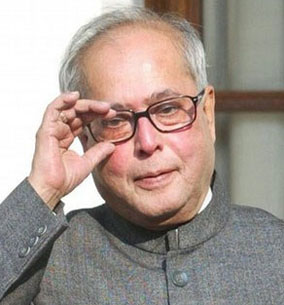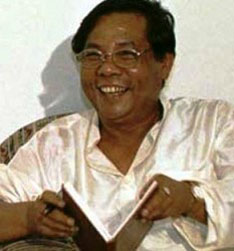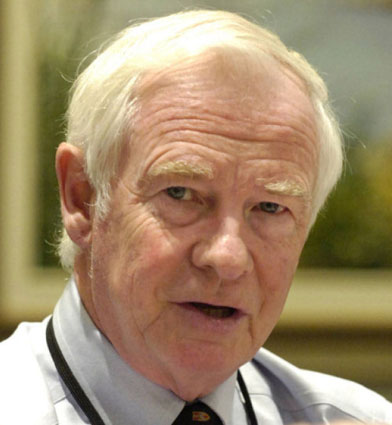If we really knew what we’re doing in Canada, we’d pay more attention to the presidential election in India
Jul 24th, 2012 | By Randall White | Category: In BriefPranab Mukherjee was elected President of India last Thursday, July 19, 2012. The results of the election were announced by the country’s electoral authorities on Sunday, July 22. Mr. Mukherjee will be sworn into office at the Central Hall of Parliament House in New Delhi tomorrow, Wednesday, July 25, by the Chief Justice of India SH Kapadia.
India today is a much more important country for the world at large than it used to be. Reports from Business Week in the USA and BBC News in the UK nicely summarize what busy anglophone citizens of the world need to know.
As explained by Business Week: “Mukherjee, 76, defeated Purno A. Sangma, 64, a former speaker of the lower house of parliament … for the largely ceremonial post. Mukherjee won more than double the number of votes cast for his opponent in an electoral college of federal and state legislators … The president oversees the creation of a government in the event of a hung parliament and can in rare circumstances send some bills back to lawmakers for reconsideration. The next general election is due by early 2014.”
BBC News has helpfully added some further nuances: “India’s media has applauded the election of former finance minister Pranab Mukherjee as the new president … The position is largely ceremonial but he could help determine who forms the next government after elections in 2014 if there is no clear winner … Mr Mukherjee’s term runs for five years … He replaces Pratibha Patil, who was India’s first woman president … The Indian Express said… the ‘aloof and apolitical president’ had always been ‘something of a misnomer’ in India … ‘Under Mr Mukherjee’s watch, it is just as well that the myth is poised for a burial’ … The Indian Express said Mr Mukherjee would face ‘manifold challenges, and not just in government formation in 2014, if no party or alliance gets a majority’ … The 2014 elections are not expected to produce a clear result. In that case, the president will play a decisive role.”
All this should have some particular interest for us in Canada as well. India, like Canada, is a so-called Westminster-style parliamentary democracy – a form of government that prevails in more than a few parts of the global village nowadays, as a legacy of the old empire on which the sun never dared to set. Even with Pranab Mukherjee’s election as president, the top political job in the Indian parliamentary democracy will continue to be held by Prime Minister Manmohan Singh – at least until the 2014 general elections, when all the people of India will vote.
President Mukherjee will be playing a role essentially like that of Governor General David Johnston in Canada today, who also has a five-year term. (Except that India long ago did away with the mystical legal fiction that its ultimate head of state is the British monarch, of whom the resident local person who actually does the job is, symbolically at least, a mere representative!)
* * * *
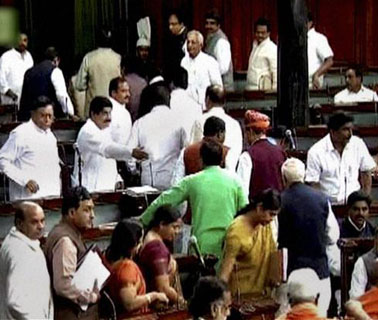
The Lok Sabha, lower house of the Indian parliament is a feisty place. Here in March 2011: “Unsatisfied over the response of External Affairs Minister S.M. Krishna over the plight of 79 Indian sailors held hostage by Somali pirates, the Opposition Bharatiya Janata Party ... staged a walkout in the Lok Sabha.”
If the 2014 Indian general elections do not produce a clear result, India will be more than arguably better served by President Mukherjee than Canada will be served by Governor General Johnston – if our 2015 general elections do not produce a clear result either (as the latest opinion polls suggest may very well be the case).
This is of course no reflection on Governor General Johnston personally, who seems a fine fellow. But when you come right down to it, in the end he has been appointed by Prime Minister Harper, who will likely be one of the parties to any dispute about who should govern, that may arise on the back of an unclear Canadian result in 2015.
President Mukherjee, on the other hand, has been elected by the several thousand members of the federal and state legislatures in India – the equivalent of all the members of the two federal houses of parliament in Canada, and all 10 provincial legislatures, or even all 13 provincial and territorial legislatures. A ceremonial head of state of this sort is bound to have more credibility, when a situation arises where his or her powers suddenly become important in the world of practical politics.
Personally, if we are going to democratically reform the current selection method for the office of Governor General in Canada (and I certainly think we should, asap) I would prefer to see us adopt the main thrust of the Irish rather than the Indian model for electing a parliamentary democratic head of state. In the Irish case the ceremonial president (or, if you like, we might still even say governor general) is directly elected by the people, from among candidates nominated by the national legislature.
In a vast, sprawling geography such as that of Canada, I think we could still very usefully adopt key elements of the Indian precedent, and use both federal and provincial legislatures as a nominating body for popular or direct head of state elections. Any prospective candidate, eg, who could secure the endorsement of some specified number of members of federal and provincial legislatures or parliaments, perhaps also representing provinces that account for some specified percentage of the Canada-wide population, would be entitled to contest a popular election, in which all adult Canadians could vote.
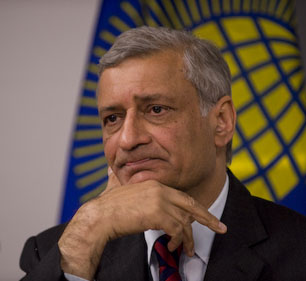
Kamalesh Sharma, current Secretary-General of the Commonwealth of Nations. Alumnus of the Modern School, Barakhamba Road, New Delhi ; St. Stephen's College, Delhi ; and King's College, Cambridge.
Meanwhile, I think we Canadians should at least be paying more attention than we usually do to such things as Indian presidential elections. India was the first old British dominion to become a republic while remaining in the modern Commonwealth of Nations. It now has about half of all the people who live in the Commonwealth, and various individuals from South Asia are not surprisingly playing leading roles in early 21st century Commonwealth institutions. If Westminster parliamentary democracy really does have a bright future in the global village (and personally again I certainly think it ought to), India is going to be playing an increasingly important role in securing this future. So … three cheers (and many best wishes) for President Pranab Mukherjee when he takes his oath of office tomorrow! And long may he reign, over the next five years!
